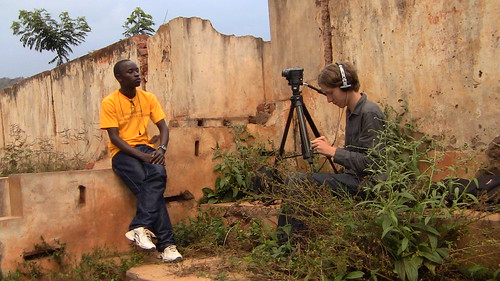Shortly after meeting with Desire the first time, a man named Mbuyi Jean Felix arrived in Rwinkwavu. We had contacted him before coming, since I had met him the first time I was in Rwanda and he had been extremely helpful. He shared his knowledge about the region with us, and helped us to arrange meetings which, though essential for the film, were difficult for us to organize because of the cultural barrier. We scheduled an interview with him as well, but more on that later. My only worry was that Jean Felix would try to arrange things that we didn't want, due both to the inevitable miscommunications which would occur, and to his own ideas about what our film should cover. This has been a frequent problem so far: people have often interpreted our project as a chance for them to get aid from a potential Western audience, so they choose to talk about their material needs rather than whatever we ask them about.
In our interview last Saturday with Jean Felix, we touched on a number of key topics for the film. He discussed the role of soccer for the country, both past an present: he talked about how soccer helped the country to recover after the genocide, and how to this day it helps kids develop both physically and mentally. I tried to get him to discuss the role of soccer in the lives of girls, knowing that soccer is used to promote gender equality in this fairly sexist society, but when he began talking about how soccer gave him a chance to educate girls about the dangers of having sex, I abandoned that thread. He did, however, provide an interesting insight into Rwandan sexism when he explained that many parents refuse to let their daughters play soccer with boys in fear that they would lose their virginity. Although at times the interview dragged on, such as when he felt compelled to detail his successes in school, or felt uncomfortable, as when he said that before the benevolent European colonialists arrived, Rwandans "were living like animals," Jean Felix provided insights useful both for us and the film about Rwanda's culture and the role of football in that culture.
Our meeting with Jean Felix also brought up a much larger question in our film: that of its 'message,' or purpose. After discussing the extreme poverty of the region with Jean Felix, Jules wanted to create a documentary which would not only reveal this poverty, but which would appeal to people to actually do something about it. I wanted to create a film which, though still exposing the poverty which would be impossible to conceal, would focus instead on the portrayal of Rwandan culture through our storyline and through soccer. This led to questions, perhaps still unresolved, about the goal of our film: did we want to make a documentary to help these people, or simply to show the culture through our perspective?
An image of Jean Felix:

In our interview last Saturday with Jean Felix, we touched on a number of key topics for the film. He discussed the role of soccer for the country, both past an present: he talked about how soccer helped the country to recover after the genocide, and how to this day it helps kids develop both physically and mentally. I tried to get him to discuss the role of soccer in the lives of girls, knowing that soccer is used to promote gender equality in this fairly sexist society, but when he began talking about how soccer gave him a chance to educate girls about the dangers of having sex, I abandoned that thread. He did, however, provide an interesting insight into Rwandan sexism when he explained that many parents refuse to let their daughters play soccer with boys in fear that they would lose their virginity. Although at times the interview dragged on, such as when he felt compelled to detail his successes in school, or felt uncomfortable, as when he said that before the benevolent European colonialists arrived, Rwandans "were living like animals," Jean Felix provided insights useful both for us and the film about Rwanda's culture and the role of football in that culture.
Our meeting with Jean Felix also brought up a much larger question in our film: that of its 'message,' or purpose. After discussing the extreme poverty of the region with Jean Felix, Jules wanted to create a documentary which would not only reveal this poverty, but which would appeal to people to actually do something about it. I wanted to create a film which, though still exposing the poverty which would be impossible to conceal, would focus instead on the portrayal of Rwandan culture through our storyline and through soccer. This led to questions, perhaps still unresolved, about the goal of our film: did we want to make a documentary to help these people, or simply to show the culture through our perspective?
An image of Jean Felix:

No comments:
Post a Comment